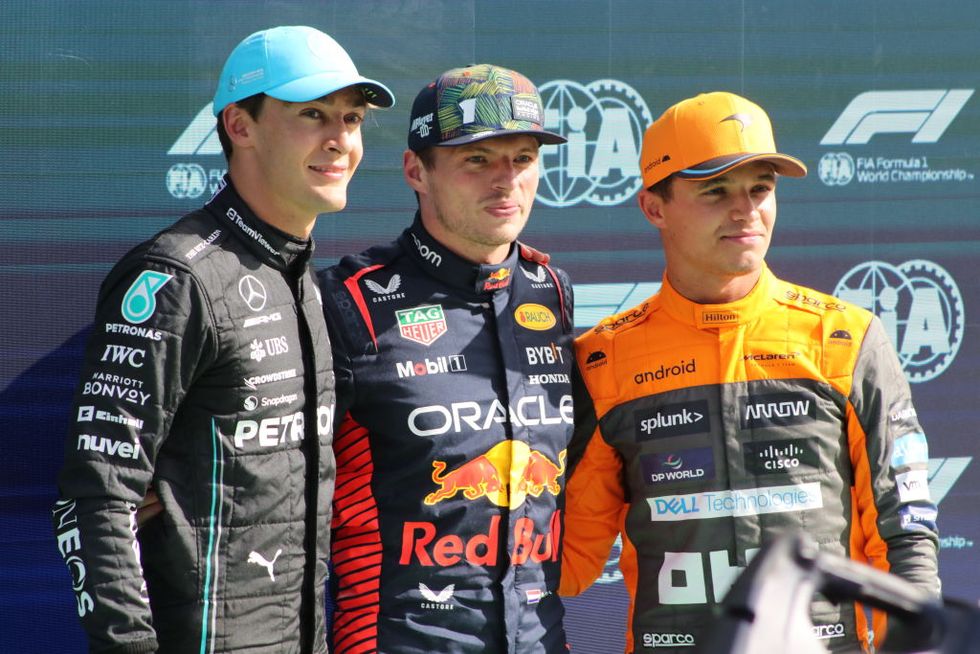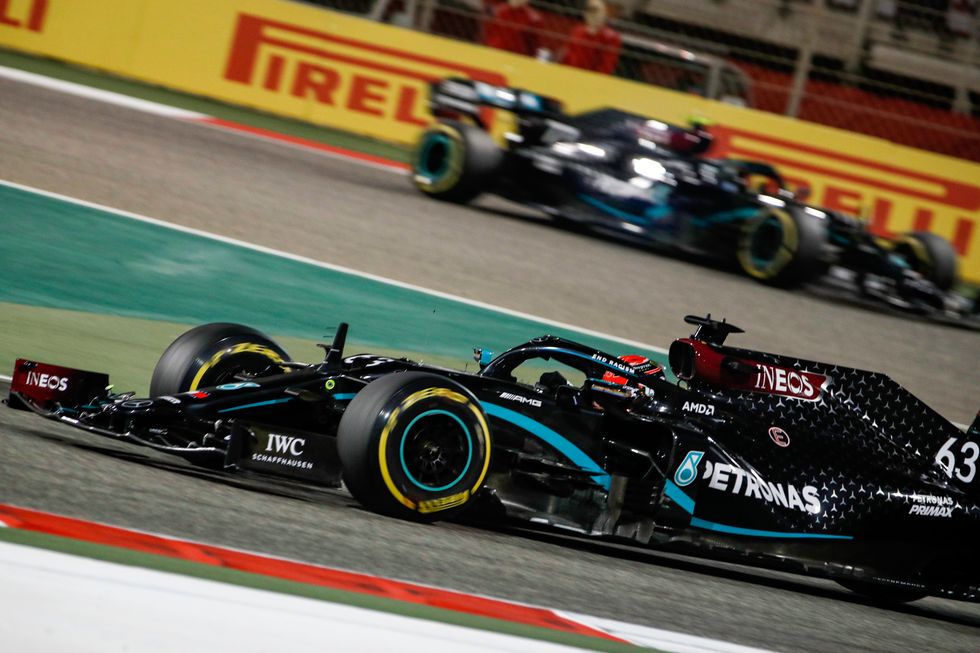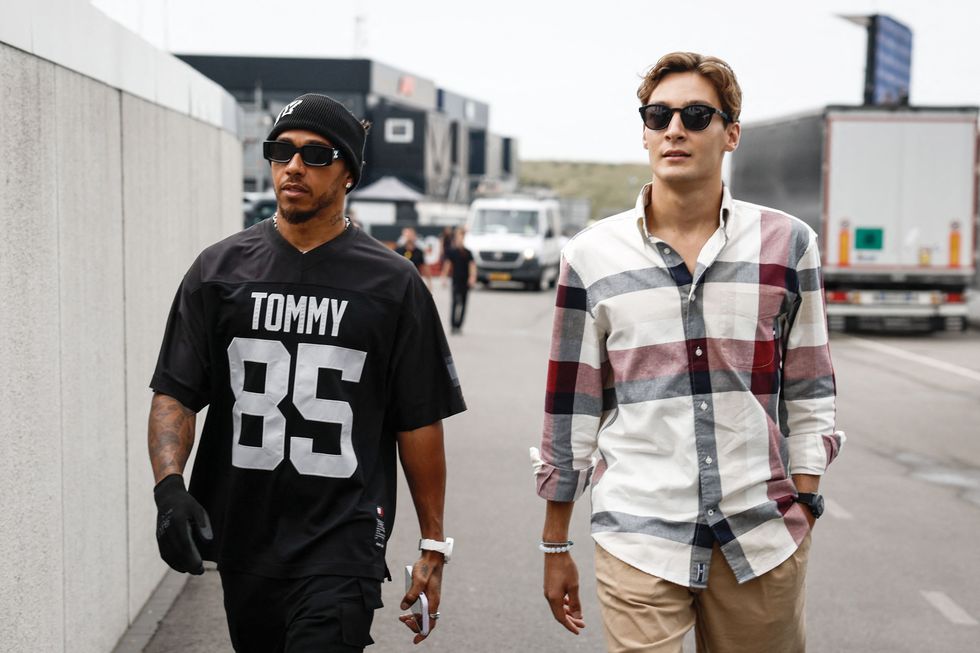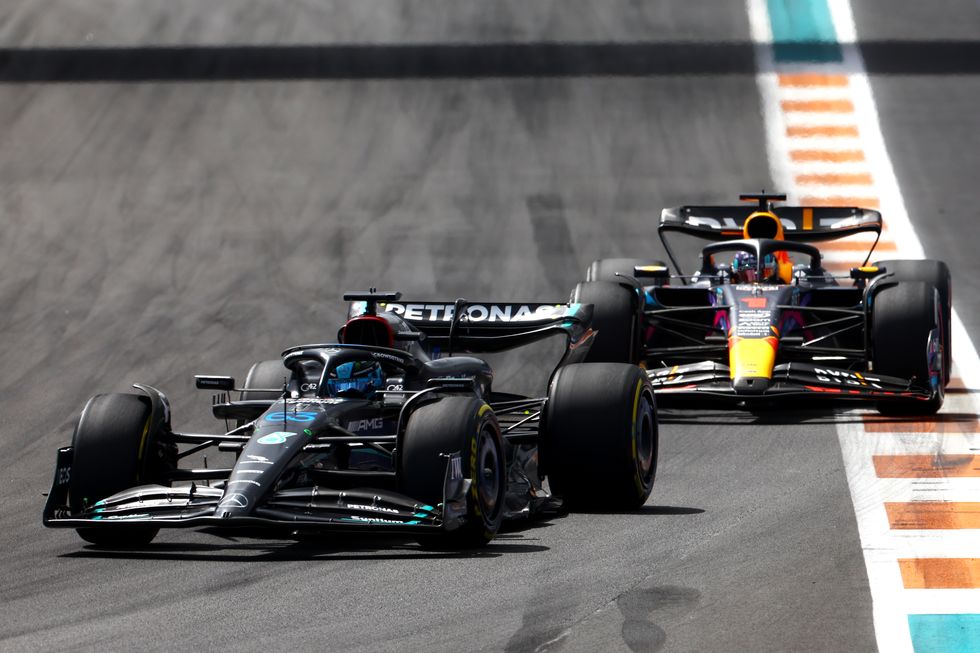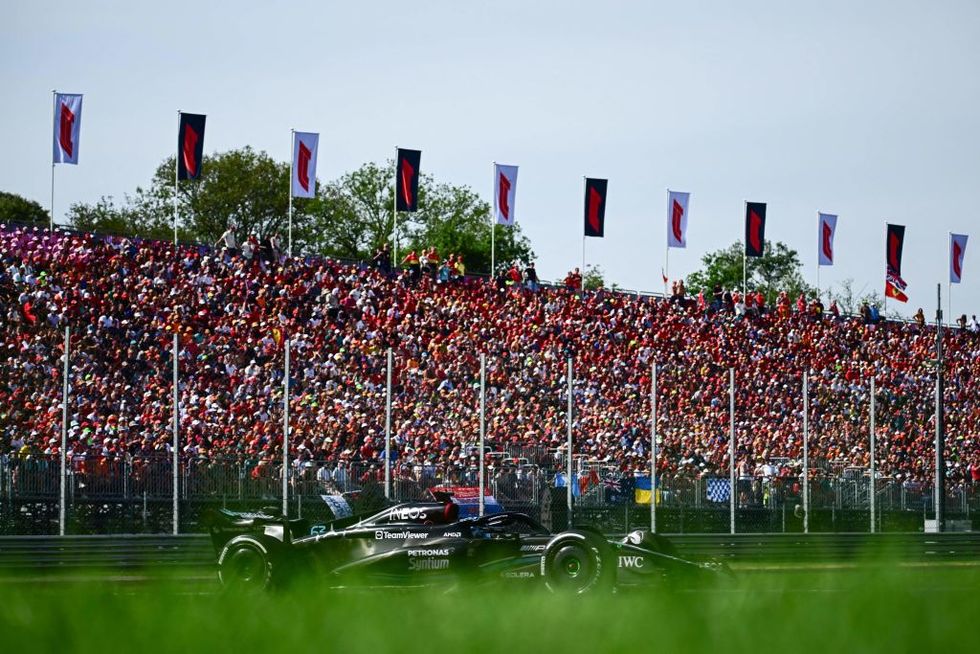George Russell stepped up to make his first start for Mercedes in 2020 when the Silver Arrows were still the kings of Formula 1. But they were dethroned by long-term rival Red Bull and now the hunted has become the hunter. Russell sat down with Autoweek at the recent Dutch Grand Prix to discuss Mercedes’ planned recovery, his progress, and his status within Formula 1.
It feels as if George Russell has been part of Formula 1 for a long time, but 2023 is still only the 25-year-old Briton’s fifth season in the championship.
He is a wise head on young shoulders, tackles questions head-on with honesty, and possesses that crucial combination of almost arrogant self-belief yet self-awareness of how to still improve.
This season is just his second racing full time for Mercedes—he first tested with the team back in 2017—and it has been a year in which his measured rise has slightly plateaued.
That has partly been driven by Mercedes erring with the design of its car for a second successive season while other results have slipped through the net on account of operational mistakes. He’s currently seventh in the Formula 1 Drivers’ Standings and has one career win (Interlagos in 2022).
“We definitely made some wrong decisions over the winter last year that set us back quite a little bit and that’s why we’ve being playing catch up so far this season,” Russell says. “I think every race that goes by we understand things further and clearer.”
Mercedes reacted to its humbling start to 2023 by reshuffling personnel, most prominently switching the roles of James Allison and Mike Elliott, with Allison returning as technical director, and Elliott becoming chief technical officer.
The W14—a poor machine by Mercedes’ lofty standards—is still strong enough for Mercedes to be second in the standings. But Mercedes has finished best-of-the-rest to Red Bull only twice from 14 starts this season (Australia and Spain), which is fewer times than Aston Martin and Ferrari. Its advantage has come from being a more consistent operator in that entertaining jostle for second, usually third-best but suffering less performance dips than its three rivals, which includes mid-season risers McLaren.
“Something we’ve been trying to improve a lot is just the through corner balance of the car,” Russell explains. “I think both Lewis (Hamilton) and I are searching for a bit more confidence and rear end in the car so that we can hit the ground running during a race weekend. I think that’s something that Red Bull have done a really great job of: allowing their drivers on lap one of the weekend to go out, push it to the limit and in little fear of crashing the car or spinning out.
“But it’s always marginal gains in many areas. If you can find half a tenth here, half a tenth there, suddenly you can add that up to a large chunk of lap time. So, you know, that’s just what we’re working through at the moment.”
Russell joined Mercedes full time in 2022, in advance of new ground-effect regulations, meaning his arrival coincided with the slump of the Silver Arrows. Mercedes won 111 races across its eight-season title streak between 2014 and 2021 but has triumphed only once—Russell’s stirring maiden victory in São Paulo last year—since then.
“Obviously, the results haven’t matched the hope or expectations that I was, or we as a team were, expecting going into these two seasons,” says Russell. “But I always knew when I signed in 2021 that there were no guarantees of success. I always describe it as like a big oil tanker. And if you’re pointing in the right direction, you’re going to get to your destination quicker than if someone’s pointing the right way, trying to turn that ship. It takes time. And, you know, we’re in that turning phase to point in the right direction. And we think that we’re kind of in that right direction now to build upon.”
Russell highlighted “the turn of form that Aston Martin had over last winter,” as well as McLaren’s mid-2023 surge, as reasons to believe that sizeable performance gains are possible, ensuring Red Bull’s supremacy isn’t locked in until regulations change in 2026.
“We saw Red Bull catch Mercedes in the Mercedes era as well in 2021,” he says. “That was sort of unforeseen as well as 2020 for Mercedes was a really dominant year, and in 2021 Red Bull started with the quickest car.
“We’re not going to put any huge expectations upon next year. We’re sort of taking it race by race, making sure we’ve got all of the right information to make the best decisions possible between now and the Bahrain test next year.”
Russell has had a lengthy affiliation with Mercedes, stretching back to 2017, when he joined its young driver program. Russell claimed that year’s GP3 title, the Formula 2 crown in 2018, and spent three years with Williams, serving an apprenticeship of sorts with Mercedes’ customer team. Russell earned a strong reputation for overreaching in uncompetitive machinery while also adopting a vocal leadership position amid Williams’ struggles, confident from the outset in his own ability.
However it was in 2020’s penultimate race in Sakhir, where he was called in by Mercedes to replace the Covid-benched Hamilton, that Russell came to the fore. He maturely controlled the race until a botched pit stop and then a puncture wrecked his chances. It nonetheless signaled he could perform at the sharp end of the grid and Mercedes signed Russell to a long-term deal from 2022.
While Mercedes has had a tricky season, Russell has also had a subdued campaign. There has been just a solitary front row start, one podium—a third place in Spain—and he is seventh in the championship, 55 points and three places behind Hamilton.
“I think I started off this season really competitively,” Russell says. “I think at the first six races qualifying was a real strength of mine. Recent races have been a bit more challenging for me and I think we’ve made some wrong decisions with the setup direction we’ve been taking.
“I think this is where the summer break was really important to take that reset and start again because… you find yourself in a bit of a channel and you sort of keep following the same trends because you believe that is what’s right and what’s needed for the car. It’s only when you take one step out and look at it with fresh eyes, you think, actually, we probably need to be in a slightly different channel to maximize it.”
Does that mean he finds it important not to analyze a situation too deeply to avoid getting stranded in too much detail?
“Yeah, I think when I perform best is when it just comes to me and by not overanalyzing things,” Russell explains. “It’s very difficult to not overanalyze things when you’re slightly on the back foot because you feel like you need to do more to improve and work harder to find that solution. But sometimes you need to take one step back to go two steps forward and focus on the simple things. And perhaps we’ve been focusing too much on the detail and slipping up slightly on the simpler things that deliver the most amount of performance.”
Russell emphasized that he is “not stressed” about the situation and is adamant he can return to his best form.
“I know where the mistakes that I made are, and there is a reason for why I slipped back a little bit,” he reflects. “And as I said, going in with a fresh set of eyes now I’ve got no concerns that the form will reappear. It’s always the way when things are a little bit more challenging. You know, you’re pushing for more. We started this season on the back foot. We wanted to be winning. We weren’t winning. And then you’re chasing unrealistic goals. And it’s probably sometimes you need to recognize that if that (result) is the maximum, it’s important to fulfill that potential rather than trying to overstretch, getting it wrong and actually being three positions further down.”
Russell’s summation has so far proved accurate; in the two races since this interview was conducted, he qualified third and fourth respectively. The result at Monza was particularly a reflection of that revised approach.
Russell is also cognizant that when it comes to wider perception it is always a teammate to which a driver is compared. In Russell’s instance the sister car is raced by a seven-time World Champion, who during this interview sat alone on an adjacent table in Mercedes’ motorhome scrolling through his phone.
“He’s obviously the greatest of all time,” Russell says without a hint of hesitation. “I learn a lot on and off the track from him, and he’s a huge figure for the sport. I think he’s hungry to try and win more races. I’m hungry to achieve that and beat him. Lewis still is the greatest driver of all time. And then you would define him as the quickest and the best on the grid. And I get the chance to go head-to-head with him, still now, week in, week out.
“So you want to put yourself against the best because I believe in myself and I’ve proved to myself and the people around what I’m capable of, and you gain that respect by competing against the best in the business.”
It is Hamilton who has truly transcended Formula 1 during his career, emerging as a global superstar, with projects and ventures outside of motor-racing, while being unafraid to voice his opinion on societal matters. Russell, now in his mid-20s and an established part of the front-running group, is conscious that he has an important role to play for the next generation.
“When I was eight years old, dreaming of Formula 1, you’re not dreaming of the impact you can have as the individual,” Russell recounts. “You’re just dreaming of racing cars, winning races, winning championships. But I think we all recognize the importance and the potential influence we have on people [who are] watching. And, you know, I recognize I want to leave a positive message.
“I’m not actively—at the moment at least—going out of the way to do all of these external activities to inspire others, because I feel like my platform isn’t still great enough to have as much of an impact as the guys who are obviously winning week in, week out. And I recognize that the greatest way to have an impact is to win because you’ll be growing your profile, and it’s probably something I will think about when I’m in my 30s maybe.”
Nevertheless, Russell’s forthrightness meant he was appointed as a director of the Grand Prix Drivers’ Association—the body which represents all 20 active racers—after only two seasons in the sport. The recently retired Sebastian Vettel is still a director but it leaves Russell as the sole representative among current drivers.
“There are obviously a lot of changes going on with the sport at the moment, with the sprint races, the format, the alternative tire allocation, the conditions, you know, the safety aspect of things,” says Russell. “You want the circuits to be as safe as possible (and) no unnecessary risks.
“You’ve then got the on-track entertainment side of things, and how exciting the races are, which I guess the tires are a factor, the degradation, the format, DRS positioning, etcetera, etcetera.
“(Then for drivers) you’ve got how it feels to drive the cars: we want the fastest cars, the best cars, the lightest cars, the most amount of power and we think that would add to the spectacle. But you can’t often achieve all of these topics.”
Russell was nonetheless keen to emphasize that Formula 1 “is in a good place” and that “there has been quite a lot of exciting and close racing, with good battles,” at least for second place. Red Bull’s domination is “a bit of a shame,” detracting from the fierce fights behind, but Russell underlines that “they are obviously doing an amazing job and you need to give them credit for that.”
Red Bull spent years chasing and chipping away at Mercedes and now the boot is on the other foot, with the Silver Arrows striving to unseat the unbeata-Bulls.
Russell agrees that “you obviously dream of jumping in the car and just winning every single race, but, you know, it’s not like that for anybody,” and even those who have dominated Formula 1 have been forced to battle through rough waters.
“Max (Verstappen) spent four years at Red Bull before he got his chance of truly fighting for a championship,” Russell recounts. “And the same with (Michael) Schumacher, when he went to Ferrari it was four years before he won a championship, whereas we all look at him as the guy who was at Ferrari, dominant, won everything, you know, it took four or five years before he got that success there.”
And he is adamant that he has never contemplated seeking a future outside of Mercedes.
Russell is tied down to Mercedes through at least 2025—the same length as Hamilton’s contract—following Hamilton’s recent announcement.
“We’re on this journey and it’s sort of like we’re bound to one another,” says Russell on his relationship with Mercedes. “You’re like a married couple, you’re in this together.
“I think if you’re with Mercedes or Red Bull, you can be very confident that if one isn’t winning, the other one’s going to be right there chasing and I wouldn’t want to be anywhere else.
“Mercedes were the ones who believed in me. They’re the ones who supported me. And I feel almost like a duty to return their faith in me, with loyalty, with delivering my best and ultimately delivering a championship with them: that is my dream and my goal.”
Read the full article here



